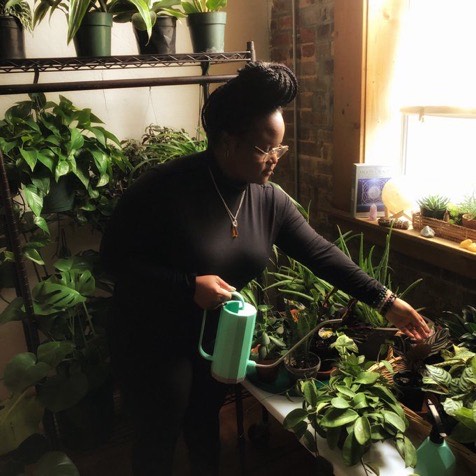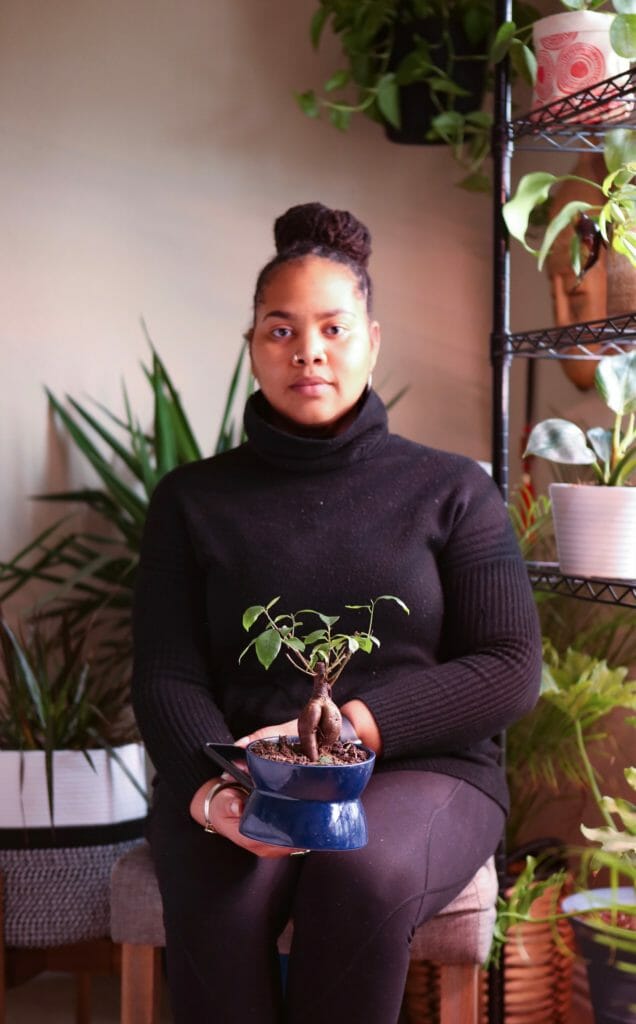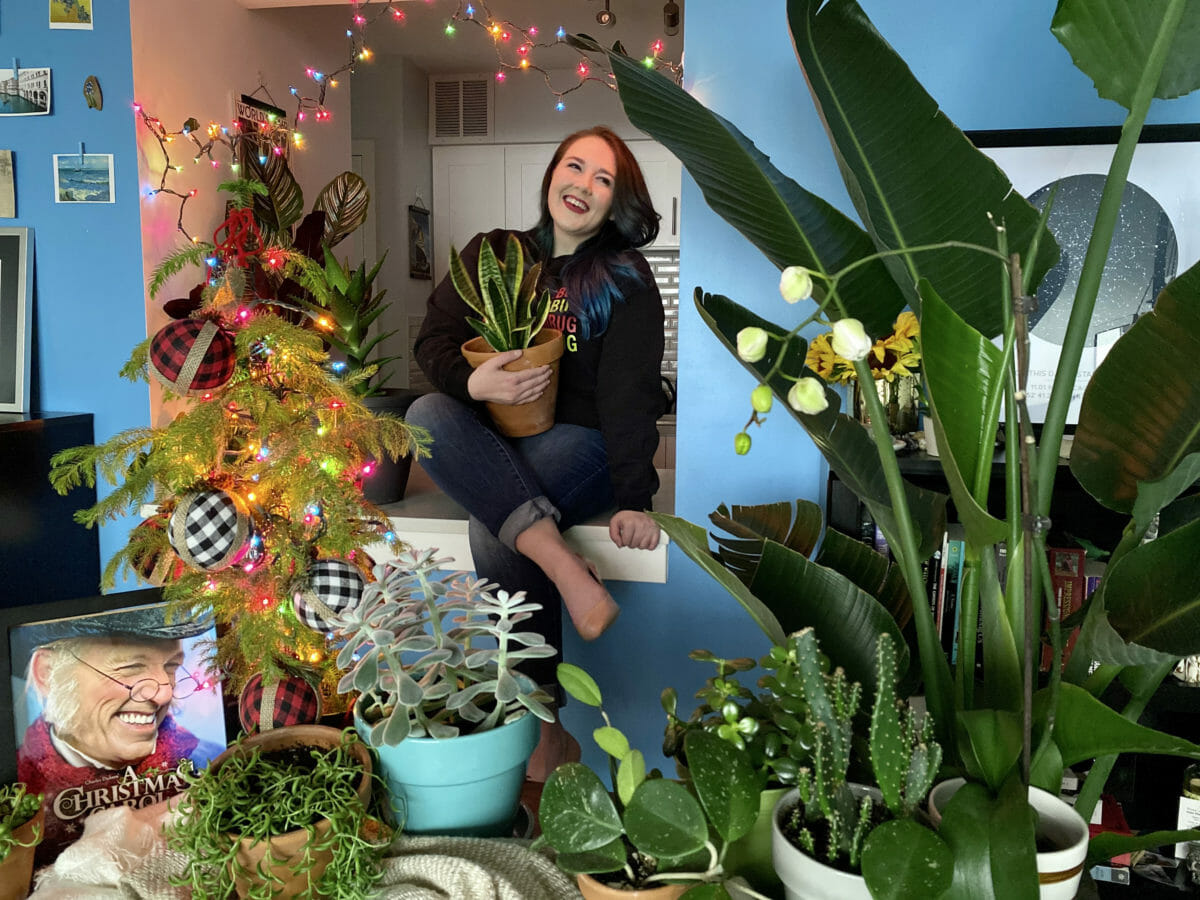A Community of Plant Parents Grows in Confinement
Plant heads have adopted many new green babies over the last year.
A Community of Plant Parents Grows in Confinement
Plant heads have adopted many new green babies over the last year.

Jai Williams devotes every Sunday to taking care of her plants. courtesy of Jai Williams
In May 2020, Fernanda Meier walked into a nursery to buy a few plants that would be hard to kill. The Dallas social worker had started the pandemic with just one lonely plant and wanted to purchase some new friends.
She walked out of the nursery that day with a couple of succulents and a snake plant. Two weeks later, she returned and bought more. She then returned again and again until her plant collection swelled to nearly 80 plants.
“My apartment is now a jungle,” she says.
Meier and many others have flourished into proud plant parents during the pandemic, adopting plant babies to care for and spend time with when contact with humans has been limited. Nurseries and garden centers have seen boosts in sales of houseplants as those largely confined to their homes have sought to add some green to their immediate surroundings.
The pandemic started at the beginning of what is usually garden centers’ busy season, and many successfully pivoted to create online stores. They couldn’t have walk-in customers in those early days, but they found that many people kept buying plants. The houseplant industry has been experiencing a boom in recent years, but garden center owners say things really took off during the pandemic.
“When people started working from home, the desire to green up their spaces became something that was important to them,” says Gina Pellino, a manager at the Chelsea Garden Center in Brooklyn, New York. “We’ve heard from many customers that, instead of traveling, they stay-cationed and that money went into making their homes more of an oasis.”
Past research has shown that gardening, plants and generally being close to nature can be beneficial for mental health. And houseplants have been particularly good for those confined to their homes during the pandemic, a recent study suggests. This international study found that houseplant ownership during the pandemic correlated with positive emotional well-being for housebound plant parents. Researchers sent out a plant questionnaire and received answers from more than 4,200 people around the world. Amost 74 percent of respondents agreed that having some kind of vegetation inside their homes contributed to their state of mind in a positive way during the pandemic. Luis Pérez-Urrestarazu, one of the study’s authors, says a big problem for many people living in cities during the pandemic has been that it’s been harder for them to connect with nature. He points to the psychological impact of owning plants but also more quantifiable benefits such as the fact that they can improve the air quality of a room.
Pérez-Urrestarazu says there isn’t such a thing as too many plants, and that, in fact, the opposite is true. But his opinion comes with the caveat that he owns a lot of plants. “I am one of those [people] that have a jungle at home. Sometimes, my wife says if you get one more plant, I’m leaving,” says Pérez-Urrestarazu, who is a professor at the School of Agricultural Engineering at the University of Seville.
For Meier, who has worked as a contact-tracer during the pandemic, witnessing the growth of her houseplants makes her happy, but it also gives her something productive and positive to focus on. Even on days when she doesn’t feel like getting out of bed, she is compelled to get up to water her plants. She says they have provided routine, purpose and structure, after she felt listless and lost in the early weeks of the pandemic. Meier says she feels similarly about her plants as she did about her dog, which died in early March. She takes care of them, and in a way, they take care of her.
“They all have their own little quirks, grow at different rates, and all offer something different,” she says. “But each of them takes my mind off this ridiculous situation we’re living in. So I appreciate them.”
As she lives in Dallas, Meier lost power in her home earlier this month, but only five of her houseplants died in the cold temperatures. On the second day of the blackout, she created a makeshift greenhouse in her bedroom, using garbage bags and mailing tape. She covered all of her windows with blankets and sheets, and bagged the taller plants, moving them closer inside where it was warmer.

It’s common for plant parents to talk to their green babies and give them names. Pérez-Urrestarazu says more people have started to interact with their plants as they would a pet or another human. For Meier, reading out loud to her plants in the morning has become a bit of a ritual, and she fittingly named a couple of her ZZ plants ZZ Top (after the legendary rock band) and ZZ Bottom.
Every time Jai Williams brings home a new plant, she has a naming ceremony. She sits on her yoga mat surrounded by her plants, and introduces the new potted friends to the older ones. To determine names, Williams will look at the new plant’s species and region. She’ll then go online and find names from that region. “Then I might pick a few names and call them out to the group, and then whatever they respond to, we select that as their name and everyone is happy and claps,” says Williams, who is a photographer based in the Mississippi Delta. “We also choose what gender they want to be. I know that sounds so weird, but female, male [or] non-gendered.”
Williams bought her first pandemic houseplant in July 2020, and she eventually amassed dozens more as they thrived. She now has more than 35 and has started devoting every Sunday entirely to taking care of her plants.
Sara Costello, an actor who lives in Chicago, says she talks to her plants a lot. She has been a plant mom since 2017, but she says her collection has “gotten a little out of hand” during the pandemic. She owns around 35 plants now and she talks to them as she goes around to check on them. She speaks sweetly to her smaller plants and mostly gives them “motivational talk.”
Around the holidays, Costello says she became jealous of all the beautiful Christmas cards she was receiving from couples or people who have dogs and families. So, one day, she decided to make her own Christmas card. “I thought ‘I have a beautiful collection of plants. I’m jumping up on this counter and we’re taking this Christmas card,’” she says. “I’m so proud of how it turned out. They’re very photogenic.”

Plant parents get a lot of joy from taking care of their plants and watching them thrive and grow. But it also has given them a new way to connect with the people in their life, as well as strangers. Meier says she didn’t realize her parents were such plant lovers until she started sending them photos of her own houseplants during the pandemic. But not everyone in her family is as impressed by her plant collection. She says her sister has tried several times to hold plant interventions with her to convince her to stop buying more plants, but they have all been unsuccessful.
Plant parenthood has also given people a sense of community with strangers online. Many new plant parents have connected through social media, where they’ll share tips, questions and photos of their plants. Meier says the experience has introduced her to non-traditional plant parents who probably wouldn’t have even thought about owning plants before the pandemic, let alone 80 of them.
“It’s like I’ve found a whole new world with plants,” says Meier. “Becoming a plant parent is awesome in and of itself, but there are also a lot of different ways that has exposed me to other people and has still allowed me to develop a sense of community, being completely away from everyone in the world.”
Follow us
This work is licensed under a Creative Commons Attribution-NoDerivatives 4.0 International License.
Want to republish a Modern Farmer story?
We are happy for Modern Farmer stories to be shared, and encourage you to republish our articles for your audience. When doing so, we ask that you follow these guidelines:
Please credit us and our writers
For the author byline, please use “Author Name, Modern Farmer.” At the top of our stories, if on the web, please include this text and link: “This story was originally published by Modern Farmer.”
Please make sure to include a link back to either our home page or the article URL.
At the bottom of the story, please include the following text:
“Modern Farmer is a nonprofit initiative dedicated to raising awareness and catalyzing action at the intersection of food, agriculture, and society. Read more at <link>Modern Farmer</link>.”
Use our widget
We’d like to be able to track our stories, so we ask that if you republish our content, you do so using our widget (located on the left hand side of the article). The HTML code has a built-in tracker that tells us the data and domain where the story was published, as well as view counts.
Check the image requirements
It’s your responsibility to confirm you're licensed to republish images in our articles. Some images, such as those from commercial providers, don't allow their images to be republished without permission or payment. Copyright terms are generally listed in the image caption and attribution. You are welcome to omit our images or substitute with your own. Charts and interactive graphics follow the same rules.
Don’t change too much. Or, ask us first.
Articles must be republished in their entirety. It’s okay to change references to time (“today” to “yesterday”) or location (“Iowa City, IA” to “here”). But please keep everything else the same.
If you feel strongly that a more material edit needs to be made, get in touch with us at [email protected]. We’re happy to discuss it with the original author, but we must have prior approval for changes before publication.
Special cases
Extracts. You may run the first few lines or paragraphs of the article and then say: “Read the full article at Modern Farmer” with a link back to the original article.
Quotes. You may quote authors provided you include a link back to the article URL.
Translations. These require writer approval. To inquire about translation of a Modern Farmer article, contact us at [email protected]
Signed consent / copyright release forms. These are not required, provided you are following these guidelines.
Print. Articles can be republished in print under these same rules, with the exception that you do not need to include the links.
Tag us
When sharing the story on social media, please tag us using the following: - Twitter (@ModFarm) - Facebook (@ModernFarmerMedia) - Instagram (@modfarm)
Use our content respectfully
Modern Farmer is a nonprofit and as such we share our content for free and in good faith in order to reach new audiences. Respectfully,
No selling ads against our stories. It’s okay to put our stories on pages with ads.
Don’t republish our material wholesale, or automatically; you need to select stories to be republished individually.
You have no rights to sell, license, syndicate, or otherwise represent yourself as the authorized owner of our material to any third parties. This means that you cannot actively publish or submit our work for syndication to third party platforms or apps like Apple News or Google News. We understand that publishers cannot fully control when certain third parties automatically summarize or crawl content from publishers’ own sites.
Keep in touch
We want to hear from you if you love Modern Farmer content, have a collaboration idea, or anything else to share. As a nonprofit outlet, we work in service of our community and are always open to comments, feedback, and ideas. Contact us at [email protected].by Alex Robinson, Modern Farmer
March 1, 2021
Modern Farmer Weekly
Solutions Hub
Innovations, ideas and inspiration. Actionable solutions for a resilient food system.
ExploreExplore other topics
Share With Us
We want to hear from Modern Farmer readers who have thoughtful commentary, actionable solutions, or helpful ideas to share.
SubmitNecessary cookies are absolutely essential for the website to function properly. This category only includes cookies that ensures basic functionalities and security features of the website. These cookies do not store any personal information.
Any cookies that may not be particularly necessary for the website to function and are used specifically to collect user personal data via analytics, ads, other embedded contents are termed as non-necessary cookies.